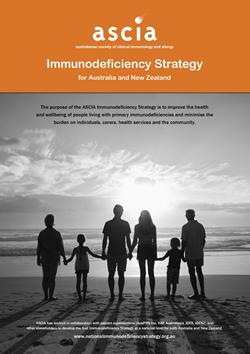
About PID
Inborn errors of immunity (IEI) include primary immune deficiencies (PID) and are a group of more than 480 potentially serious chronic medical conditions, due to inherited absence or dysregulation of parts of the immune system.
News
November 2024
In 2024 the following two ASCIA Immunodeficiency Strategy goals were achieved:
- Newborn Screening for Severe Combined Immune Deficiency (SCID) is now available throughout Australia and New Zealand.
- The ASCIA Clinical Care Standard for Inborn Errors of Immunity /Primary Immune Deficiency was developed. www.allergy.org.au/hp/papers/immunodeficiency
ASCIA Immunodeficiency Strategy for Australia and New Zealand
29 April 2022

The ASCIA Immunodeficiency Strategy for Australia and New Zealand was developed by ASCIA, the peak professional body of clinical immunology and allergy specialists in Australia and New Zealand, in consultation with patient organisations (AusPIPs, HAE Australasia, IDFA and IDFNZ), and other stakeholders. Whilst the main content of the Strategy was completed in November 2020, the final version of the Strategy is now available, to coincide with the International Day of Immunology and World PID Week.
February 2022
Since 2019 ASCIA has worked in collaboration with patient organisations and other stakeholders to develop a ASCIA Immunodeficiency Strategy at a national level for both Australia and New Zealand.
The ASCIA Immunodeficiency Strategy’s purpose is to improve the health and wellbeing of people with PIDs (primary immunodeficiencies) and minimise the burden on individuals, carers, health services and community.
Goals
The ASCIA Immunodeficiency Strategy for Australia and New Zealand has the purpose to improve the health and wellbeing of people with primary immunodeficiencies (PID), also known as inborn errors of immunity (IEI), and minimise the burden on individuals, carers, health services and community.
